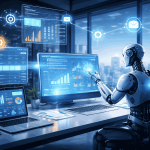
The Role of AI Platforms in Digital Transformation
Digital transformation is no longer optional—it’s essential. From small startups to global enterprises, businesses are turning to AI platforms to lead their transformation journey. In this article, you’ll learn how AI platforms are shaping the future of industries, driving smarter operations, and delivering better experiences.
This article is designed to educate IT professionals and business leaders, helping them understand how to use AI platforms to stay ahead. If you’re looking to boost your organization’s performance and innovation, this guide will show you how.
How AI Platforms in Digital Transformation Are Changing Business
The integration of AI platforms is revolutionizing how companies operate. These platforms use machine learning, automation, and analytics to improve decision-making and streamline processes.
What Are AI Platforms?
AI platforms are software frameworks that allow businesses to build, train, and deploy artificial intelligence models. These tools:
-
Automate repetitive tasks
-
Provide predictive analytics
-
Improve customer support
-
Help in real-time decision-making
By using AI platforms in digital transformation, companies can reduce costs, increase productivity, and gain valuable insights.
Why AI Platforms in Digital Transformation Matter Across Industries
Businesses across sectors are turning to AI platforms to stay competitive. Here’s how they’re doing it:
1. Healthcare: Smarter Diagnostics and Operations
In healthcare, AI platforms in digital transformation are helping in:
-
Diagnosing diseases using image recognition
-
Managing patient data securely
-
Reducing wait times through automated scheduling
Hospitals are now offering more accurate and efficient care, thanks to AI.
2. Retail: Enhancing Customer Experience
Retailers are using AI platforms in digital transformation to:
-
Personalize shopping experiences
-
Predict customer behavior
-
Optimize inventory management
This leads to happier customers and more sales.
3. Manufacturing: Intelligent Automation
In factories, AI platforms in digital transformation are used for:
-
Predictive maintenance
-
Quality control with computer vision
-
Efficient supply chain management
These improvements reduce downtime and increase efficiency.
Benefits of Using AI Platforms in Digital Transformation
When companies adopt AI platforms, they unlock several benefits.
Faster Decision-Making
AI can analyze massive datasets in seconds, providing insights that help businesses act quickly.
Improved Customer Engagement
With chatbots and recommendation engines, businesses using AI platforms can offer real-time, personalized support.
Operational Efficiency
Tasks that used to take hours can now be automated, saving time and money.
Challenges of AI Platforms in Digital Transformation
Despite the benefits, there are a few hurdles.
Data Privacy Concerns
Using AI platforms means handling large volumes of data. Businesses must ensure this data is secure and compliant with regulations.
High Implementation Costs
Initial costs for AI development and integration can be high, especially for smaller businesses.
Skill Gaps
There’s a shortage of skilled professionals who can build and manage these systems.
How to Implement AI Platforms in Digital Transformation
Here’s a simple step-by-step guide to get started:
Step 1: Set Clear Goals
Define what you want to achieve—customer satisfaction, reduced costs, or better insights.
Step 2: Choose the Right Platform
Pick an AI platform that fits your industry and needs.
Step 3: Train Your Team
Educate employees and hire AI experts to handle the platform.
Step 4: Start Small
Run a pilot project to test the platform’s effectiveness before a full rollout.
Future of AI in Digital Transformation
The future is promising. Soon, AI platforms will enable:
-
Real-time language translation
-
Hyper-personalized marketing
-
Fully autonomous factories
Businesses that embrace this future now will lead their markets tomorrow.
FAQs
Q1: Are AI platforms only for big companies?
No. Many affordable platforms exist for small and medium-sized businesses.
Q2: Is it hard to integrate AI with existing systems?
Modern digital transformation are designed for easy integration.
Q3: Can AI really make decisions better than humans?
In many data-driven areas, AI can provide faster and more accurate insights.
Q4: How long does AI transformation take?
It varies. Small implementations can take weeks; larger ones might take months.
Conclusion
The role of AI platforms is clear—they drive growth, improve efficiency, and future-proof businesses. Whether you’re in healthcare, retail, or manufacturing, adopting the right platform can help you stay ahead of the curve.
Start your digital transformation today. Choose the right AI tools, train your team, and take the leap into the future.
.
Author Profile

- Online Media & PR Strategist
- Hello there! I'm Online Media & PR Strategist at NeticSpace | Passionate Journalist, Blogger, and SEO Specialist
Latest entries
 AI WorkflowsJanuary 30, 2026Agentic AI Workflows for Automating Business Tasks
AI WorkflowsJanuary 30, 2026Agentic AI Workflows for Automating Business Tasks Cloud ComputingJanuary 27, 2026Multi-Hybrid Strategy for Cloud Resilience and Vendor Freedom
Cloud ComputingJanuary 27, 2026Multi-Hybrid Strategy for Cloud Resilience and Vendor Freedom AI WorkflowsJanuary 26, 2026On Device AI Processing for Faster, Private Mobile Interfaces
AI WorkflowsJanuary 26, 2026On Device AI Processing for Faster, Private Mobile Interfaces AI WorkflowsJanuary 23, 2026AI Driven Threats: Deepfakes, Ransomware, and New Rules
AI WorkflowsJanuary 23, 2026AI Driven Threats: Deepfakes, Ransomware, and New Rules

